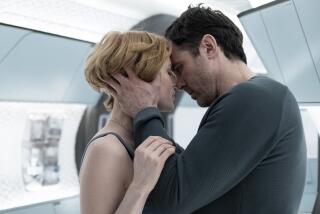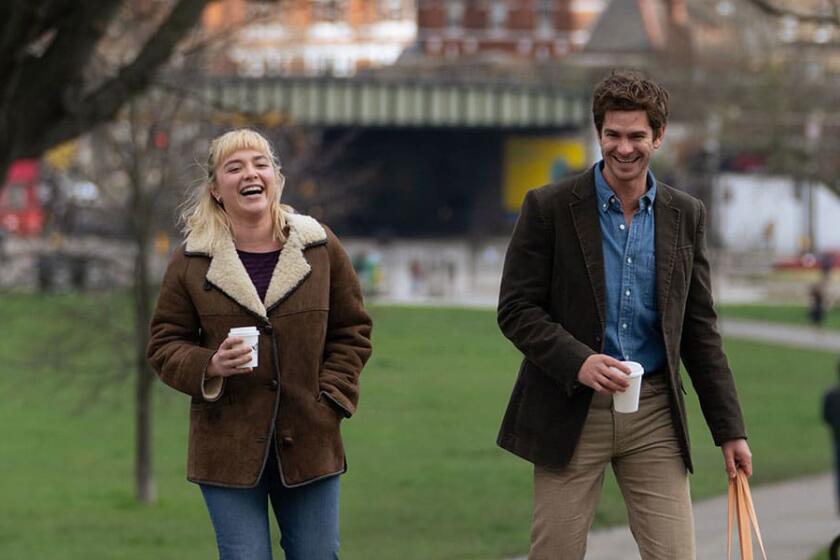‘The Great Gatsby,’ ‘Big Shot’ and the American Dream
While those of us who write about film like to believe otherwise, most movies don’t have a lot to say about social or cultural moments.
It’s partly, as you’ll often hear, because films are the culmination of a years-long effort whose moment has generally passed by the time a movie actually gets to the screen. But it’s also true for a simpler reason: In all but a handful of cases, films bear the mark of a semi-large group of people. And a semi-large group of people is about as adept at capturing a moment as a flash mob is at catching a mosquito.
Still, we journalists persist. And once in a blue moon a movie comes along that does capture a moment, or at least tries to.
Review: ‘Gatsby’s’ substance overwhelmed by Luhrmann’s style
We may be under such a moon now with two new films. The first, Baz Luhrmann’s adaptation of “The Great Gatsby,” you’ve probably heard of. The other, a sports documentary titled “Big Shot,” you probably haven’t.
First to “Gatsby.” Few claim that Luhrmann’s film is trying to size up the nature of greed and its relationship to the American dream circa the 21st century. Few, that is, except for Luhrmann himself, who in an interview before he began production described his motivations thusly: “If you wanted to show a mirror to people that says, ‘You’ve been drunk on money,’ they’re not going to want to see it. But if you reflected it on another time, I think they’d be willing to see it.”
Lest you think he abandoned this goal in the years since, he has been clear that he hasn’t. One of the main reasons he was so keen to adapt the book, he’s said, is because of what the “Gatsby” story can tell us about ourselves and the modern world. “Somehow, it is a great reflector for everyone,” he told Reuters. And that Luhrmann had an unusually large amount of creative control makes it easy to assume a single vision in a way impossible with most studio movies.
How successful he has been in capturing this zeitgeist is another matter. Plenty of critics, at least, believe that, thanks to its eye-popping 3-D set pieces, its party scenes in which scores of extras are celebrating while an aloof Gatsby is lionized, the film misses the novel’s point about the corrosive side of the American dream. The danger in using shiny, gilded surfaces to comment on a shiny, gilded age is that you risk becoming part of what you’ve set out to scrutinize, and skeptics wonder if Luhrmann’s walked right into this sand trap.
PHOTOS: ‘The Great Gatsby’ premiere
The more generous, of course, say Luhrmann is simply holding up a mirror. But many others ask if, in the movie’s orgiastic display of money (both on screen and off), he is more likely hoisting the glitz on a pedestal, glorifying what Fitzgerald had come to question. Writing in Variety, the critic Scott Foundas noted, “What Luhrmann grasps even less than previous adapters of the tale is that Fitzgerald was, via his surrogate Carraway, offering an eyewitness account of the decline of the American empire, not an invitation to the ball.” In The Times, Kenneth Turan also wonders if Luhrmann’s grandiose style has undermined the novel’s point of view.
(It won’t go unnoticed by irony-watchers that Warner Bros. has recruited as a marketing partner Samsung Galaxy, a brand that more than most offers the promise of a shiny future--a shimmering mirage, even. It probably also won’t go unnoticed that the film is coming out the same week that the Dow hit its highest point in history.)
Now to “Big Shot.” You probably haven’t heard of the film because it’s had just a few showings so far, a couple of weeks ago at the Tribeca Film Festival. Made under the auspices of ESPN, the movie will air later this year on the network, which over the last few years has been producing a group of diverse documentaries in and out of its “30 for 30” program.
Here’s the quick breakdown. Directed by the actor Kevin Connolly, “Big Shot” tells of a con man named John Spano. Hard-core hockey followers and long-suffering Islanders fans, yours truly among them, will know Spano’s story. Others will be shocked to learn of it.
PHOTOS: 50+ images from ‘The Great Gatsby’
In 1996, at the tender age of 32, Spano, a previously unknown Texas businessman, succeeded in reaching an agreement in principle to buy the NHL team and act as its owner for nearly a year, despite possessing pretty much no means to do so. With just a few hundred thousand dollars in the bank, he managed to finesse and finagle his way into a team, bamboozling a lot of important and successful people along the way. For months, Spano sat in the owner’s box and reaped the fruits of ownership (including the requisite women and wine) and was even hailed as a savior by a desperate fan base. Only after the lies piled taller than the Chrysler Building was he finally found out and removed.
Spano’s story is jaw-dropping, and speaks volumes to where the NHL and the Islanders were in those days. But “Big Shot” isn’t about hockey, no more than “Mad Men” is about ad copy. Pucks and sticks serve as a backdrop to the story of a larger tale of misguided ambition.
In fact, the most striking part of “Big Shot” isn’t what Spano got away with--it’s his reaction when he’s finally caught. When Connolly asks Spano if he has any regrets, the disgraced owner reluctantly says yes. But the film then cuts to a journalist who covered the story who says that Spano regrets only that he didn’t pull off his con, and that he would try it again in a heartbeat if he had the chance. (Spano then basically admits as much.) To Spano, the ability to up one’s social status is not just an opportunity but a right, and he’s intent on fighting for his.
Spano is a charlatan and a criminal who did time for his misdeeds. But there’s something grander, more literary, about him too. He wants to rise above his station as the owner of a small Dallas equipment company. He doesn’t understand why he too shouldn’t be able to own a pro sports team. So he concocts a past, fudges a present (including making up details about his wealth), engages in criminal activities and tries to bluster his way into success. Soon enough he’s golfing with the rich and famous and sitting in an NHL owner’s box, where thousands of fans come to celebrate and lionize him … well, you start to see the parallels.
In the end, “Big Shot” is less about one shyster than about the forces that moved him -- about the distortive power, really, of the American Dream. Fitzgerald would more than relate.
I have no idea if Connolly has read “The Great Gatsby;” it didn’t come up when we chatted briefly after the screening (we mostly talked about hockey). But his film shows something essential about movies and the zeitgeist: Sometimes the best way to capture the spirit of a book — or of a moment — is not to try to capture it at all.
ALSO:
Movie Review: ‘The Great Gatsby’
Baz Luhrmann wants to ‘reveal’ more of ‘The Great Gatsby’
At ‘Great Gatsby’ premiere, a 3-D celebration of Fitzgerald’s 20s
Follow me on Twitter at https://twitter.com/ZeitchikLAT
PHOTOS AND MORE
VIDEO: Upcoming summer films
ENVELOPE: The latest awards buzz
PHOTOS: Greatest box office flops
More to Read
Only good movies
Get the Indie Focus newsletter, Mark Olsen's weekly guide to the world of cinema.
You may occasionally receive promotional content from the Los Angeles Times.











